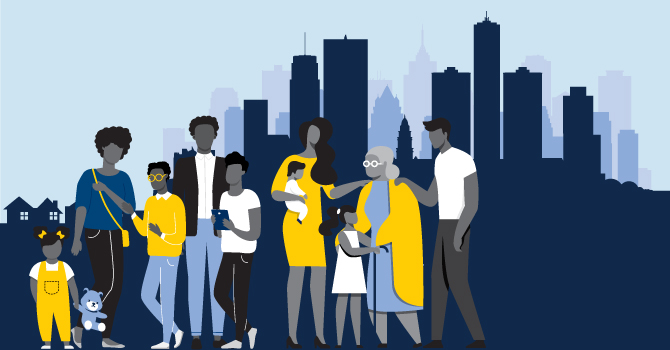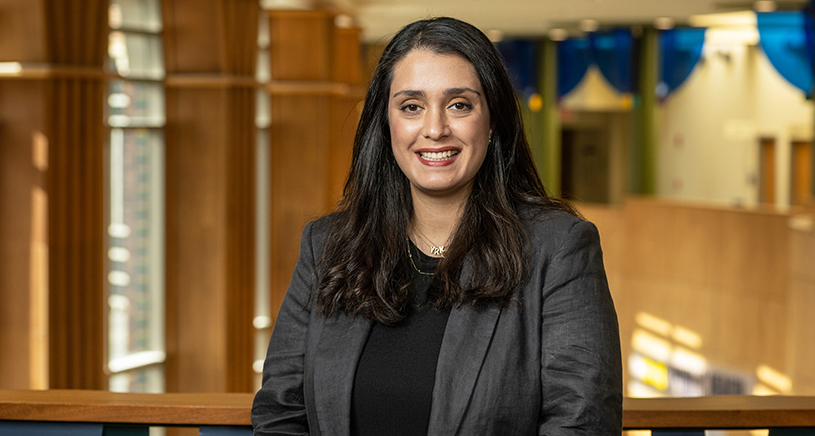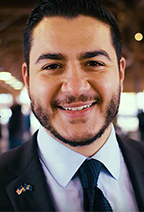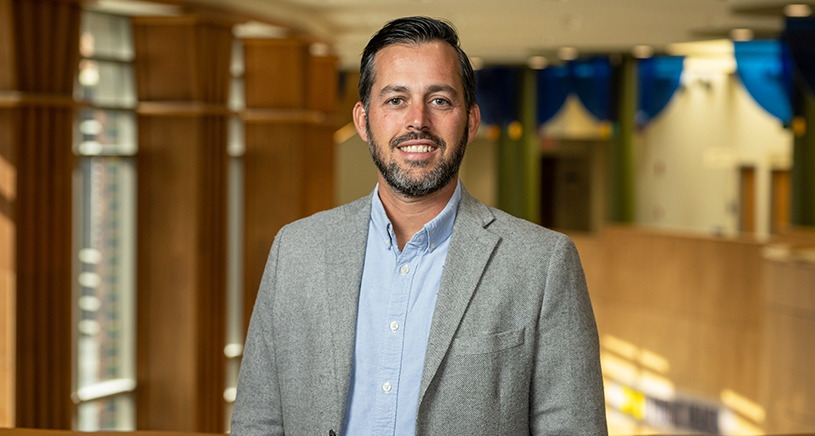A City of Resilience: Public Health in Detroit

Detroit is more than a single city—it’s hundreds of neighborhoods and hundreds of thousands of people living, working and growing together.
In Population Healthy’s season 1 finale, University of Michigan researchers and alumni including Abdul El-Sayed and the Skillman Foundation's Tonya Allen explore the unique public health challenges facing the Motor City and how they’re working directly with Detroiters to help make the city a healthier place.
Listen and subscribe to Population Healthy on Spreaker.
|
Subscribe and listen to Population Healthy on Apple Podcasts, Spotify, Google Podcasts, iHeartRadio, YouTube or wherever you listen to podcasts! Be sure to follow us at @umichsph on Twitter, Instagram, and Facebook, so you can share your perspectives on the issues we discussed, learn more from Michigan Public Health experts, and share episodes of the podcast with your friends on social media. |
[music]
00:04 Tonya Allen: I think that Detroiters are some of the hardest working people I've ever met with a resilient spirit. I remember when the economy was doing really bad, we had the downturn in 2008 period, and I remember going to a community meeting and I was so depressed about the economy, because it was such a daunting period; it was for Michigan a lost decade. And I remember going to this community meeting, and I thought to myself, "The people in the neighborhood aren't gonna show up. Like, this is so depressing." And I remember going into that and there was just so many of them and they were vibrant and energetic. And I asked, I said, "Aren't you depressed about what's happening in the country? Everybody else is." And they said, "No. Tough times always happen in Detroit." Our responsibility is to always show up in the face of tough times, and that to me really speaks to this kind of resilient spirit of Detroiters. It's why I love them and I love this city.
01:02 Narrator: Lately, Detroit seems to be the city that's launched a thousand conversations. Pundits, columnists and talking heads are discussing Detroit as if it's a living thing. Detroit's economic health, and its cultural relevance provide constant fodder for analysis and scrutiny. Here in Ann Arbor, we're just 35 miles from the city center, and we know that Detroit's influence ebbs out across our state. And rather than seeing Detroit as a singular it, we see hundreds of neighborhoods with hundreds of thousands of people living, working and playing. Today, we're not just talking about Detroit, we're talking about Detroiters and their health.
01:42 Narrator: Hello and welcome to Population Healthy; a podcast from the University of Michigan School of Public Health. Join us as we dig into important public health topics, the stuff that affects the health of all of us at a population level, from the microscopic to the macro-economic, the social to the environmental, from neighborhoods to cities, states to countries and around the world.
[music]
02:15 Narrator: In this episode, we'll be talking with researchers who are working directly with Detroiters on a variety of public health issues and with University of Michigan alumni who work to make the city a better and healthier place. We start with Abdul El-Sayed, a public health doctor and graduate of the University of Michigan. He was the Health Director for the City of Detroit from 2015 to 2017.
02:35 Abdul El-Sayed: My role was to rebuild the health department after it had been shut down, and worked on a number of issues in that work. I really wanted to focus on the wellbeing of children, rebuilding our department around breaking down barriers that kids had to learning and earning in Detroit, like we'd want for any kid anywhere.
02:50 AE: So the thing about public health, is that oftentimes we focus on the disease outcomes, but they're really the tips of icebergs, on a syndrome of interlocking challenges that people face, and they show up in a number of ways, right? The causes of infant mortality, the causes of asthma, the causes of lead poisoning, all issues that are front and center when we talk about health in the City of Detroit, alongside issues like heart disease and diabetes, strokes and even preventable cancers, they're all caused by the same set of predictors. When we talk about the social determinants of disease, it's really the fact that people living in poverty without access to high-quality work opportunities, without access to good transportation, who are forced to live in homes that are in disrepair, in communities that expose folks to trauma, where the air is poisoned, the water may not be clean or too expensive so it's in-affordable, or there's not access to high quality foods. Those all come together. They're a syndrome.
03:47 AE: And so, while we were focused on a number of outcomes, because that's how we think about health, really the goal was around disrupting intergenerational poverty by focusing on outcomes that would transmit poverty into another generation. And so, really focusing on kids for us was critical, because if you can address the circumstances that shape a kid's life for the worse, and the health consequences of those circumstances, you can potentially allow that child to... I hate to say it, break the statistics. The challenge of poverty is that, what it does is it forces you to toggle between a set of needs, and if we can be a part of breaking down barriers, a part of helping to provide those children a supplement for the opportunities that they have, then perhaps we can give those kids a booster, right? And the most important thing we can do is provide kids with the means of being able to live their best and most dignified life into adulthood. And so, if we focus on those outcomes with kids, the knock-on effect in a community is great. And that doesn't mean that we should be ignoring the health of adults, and we didn't when we were at the Health Department. But it does mean that if we can intervene in those outcomes that may hamper a child's life in the long run, the outcomes are just far more effective per dollar that we can spend.
05:02 AE: One of the things that I'm really proud of is a program we put together to provide every child a pair of glasses at school; a very simple thing. I can't imagine what it would be like sitting in the back of a class and you can't even see the blackboard and the circumstances of your life suggests that nobody has come to appreciate that you can't see the blackboard. And so, you try and entertain yourself, like most kids do, and usually that's done at the expense of a classmate or the teacher, and you get labeled a bad kid. And once you get labeled a bad kid, and at that point, you see the entire institution as being against you, and so it creates a pattern. And the fact of the matter is, again, you can't disentangle that with the facts of race in the way that a young African-American child is going to be perceived if they get in trouble. And so, if you can get the kid a pair of glasses, all of a sudden, all of that stuff that's happening at the front of the classroom becomes intelligible and you can fundamentally change its directory of a life. And I'm thankful that the program that we built has now provided 6,000 pairs of glasses.
05:53 AE: A lot of the work that we did in the city was to establish the Health Department as an important bulwark in the fight for environmental justice, which is a serious issue in a community like Detroit where our kids face three times the likelihood of being hospitalized for asthma mostly because of the quality of air that they breathe which is highly polluted because Detroit is a largely industrial city, and because the city hasn't ever really stepped up on making sure that the corporate citizens in that community were responsible and accountable to the people who live in those communities. And so we stood up against Marathon petroleum refinery, we did a lot of work around uncovered storing of this metallurgical Coke, the stuff that releases fugitive dust in the air forcing companies to cover their pile so that that dust didn't get released into the air, that our kids are breathing and made sure that there was no fracking waste being trucked into the city, which was a proposal on the table at one point. I think the department has continued down that path, of being a leader in the fight for environmental justice, and my hope is that every one intervention increases the effect of another intervention. And over time, what you're doing is you're creating a system by which you have now become an ally for kids who are growing up in the city and trying to give them that boost that we talked about.
[music]
07:12 Narrator: In any large city, Housing and Urban Planning can have a big impact on public health. Detroit however, faces unique challenges when it comes to the availability and conditions of housing. Roshanak Mehdipanah is an assistant professor of Health Behavior and Health Education at the University of Michigan School of Public Health. Her work focuses on cities and how cities impact our health.
07:33 Roshanak Mehdipanah: I would say housing availability, and conditions have been an issue in Detroit, over the last 10 years, although many cities across the US faced great loss during the mortgage crisis, Detroiters face the second phase of loss through the tax foreclosure crisis. Since 2010, more than 47,000 occupied properties have entered foreclosure auction. And so essentially Detroit's tax foreclosure prices reached its peak in 2015 when nearly 25,000 properties were offered at auction including more than 6,400 owner-occupied homes. So while the rate of owner-occupied tax foreclosure has declined significantly in the recent years, there's still risk among Detroit homeowners for losing their properties.
08:27 RM: We also know that tax foreclosure impacts African-Americans more so than their white counterparts, and the five predominant African-American cities in Wayne County have suffered the highest rates of tax foreclosure on residential structures from 2013 to 2016. Although less studied, foreclosures have great impacts on people's health, and not only from the trauma of losing your home and being forced out but also to the potentially being forced out of your community, one that you've built over many years. Furthermore, tax foreclosured homes often become vacant properties that have been linked to increased blight and subsequent crime in those neighborhoods. So we know this is a big issue in the city with consequences for people's health.
09:16 RM: Detroit's tax foreclosure process consists of a household, not paying their property taxes for three consecutive years, and this results in the forfeit of the property to the Wayne county treasurer, where it is then auctioned off in an effort to recover any lost revenue. Now the poverty tax exemption also known as the PTE or the home owner's property Tax Assistance Program HPTAP in Detroit focuses on eliminating, or in a way, reducing property tax burden among low income or financially struggling homeowners. However, despite these benefits, it remains a severely underutilized program, and one of our studies has been able to provide empirical evidence around barriers like lack of information or awareness of the program or the complicated application process or the need to re-apply and go through the process every year.
[music]
10:20 RM: Some of the work that we've been doing here at the school of public health looks at the multi-dimensional effects of housing, and these include things like affordability, access and conditions and how these impact health individually and jointly. When we talk about affordability, we are referring to how much a household is paying towards housing costs like rent, mortgage, property taxes, and utilities and how much they are left with after paying for all of these to be able to purchase necessities like food, medication, and clothes. Access refers to physical and social barriers, like housing discrimination and gentrification that limit individuals housing options, and in the neighborhoods that they want. And then finally, conditions refer to the physical structure within and around the home that could cause harm, or some form of injury like lead pipes or poor air circulation that could result in mold build-up and such.
11:26 RM: In Detroit, some of the programs that are aimed at improving housing tend to focus on one of these dimensions which can be a bit problematic. So for example, we've seen efforts to keep Detroiters in their homes, but the housing stock in Detroit tends to be very old. So people are either spending all their income on repairs or are essentially forced to relocate. There are some great organizations like the Eastside Community Network and its Housing Task Force, or the Detroit Hispanic Development Corporation working on housing issues and ensuring housing stability and security for their residents.
12:05 RM: I think people don't realize how housing is really at the core of public health and how some of these other determinants are so heavily influenced by where your house is located, the conditions of your home, and things like that. We talk about school segregation. The school segregation stemmed off of residential segregation. We talk about the lack of jobs and employment but what people don't talk about is how the discrimination of where you live determines, in many instances, the job that you can apply for. These are the things that come along with housing as a determinant of health. Everybody would rather have shelter over their heads, and often have to pick shelter over food and over medication. And we see this happen all the time where people are forgoing their medications because they wanna pay rent for their homes. And then the spiraling effects of that, if you're not able to take medications, then that health issue that you're addressing can become even more severe. Which will eventually lead you to potentially losing your home all together. I think there's still a lot of room around this discussion. And I'm really grateful that I get to be at the forefront of these discussions, but I wish I had more time to address the issues rather than to defend the need to focus on housing as a determinant of health.
13:42 Narrator: Detroit is a diverse city that includes a large immigrant population from countries across the globe. And this contributes to the city's rich culture. Paul Fleming, Assistant Professor of Health Behavior and Health Education at the University of Michigan School of Public Health, does community-based participatory research with a Latino immigrant population in Detroit.
14:03 Paul Fleming: The neighborhood of Southwest Detroit is a very unique neighborhood. Historically, there was many Mexican immigrants that had moved there, over the past century and it to this day remains the part of Detroit that has the most Latinos. It's also a very diverse neighborhood so it's not just Latinos in that part of Detroit. Over the past two years I've been working with the Community Health and Social Services Center, also known as CHASS, which is based in Southwest Detroit. They're a non-profit organization, they're a federally qualified health center and they provide comprehensive accessible and affordable quality primary care services, as well as other types of support services for the surrounding community. They do provide services to just about anybody that walks through their doors, but given that they are based in Southwest Detroit, a large proportion of their population that they do serve are either Latino or immigrants. The project I work on with CHASS is focused on the heightened fear and anxiety that immigrant families are facing, particularly over the past couple of years, and the heightened fear and anxiety is really related to some of the policy changes that have been implemented both at the federal level and the state and local levels.
15:14 PF: What immigrant families are experiencing, is they're seeing more and more community members being detained or deported as part of immigration enforcement activities. Anecdotally, what we've heard from these families is it appears to be more and more random now, whereas previously they may have targeted folks with a criminal record. Now, it seems to be that any immigrant that perhaps doesn't have documentation status is being targeted. And what that results in, is kind of a degree of hyper-vigilance, where families are trying to protect themselves from being spotted or approached by immigration enforcement officials, and this heightened fear and anxiety is contributing to poor health outcomes. And there's a couple of different ways that works. Immigrant families who are experiencing this fear and anxiety, we're seeing that they're less likely to go to the clinic for clinic services because they're worried about traveling to the clinic. And then we also know from lots of different research, including that being done here at the School of Public Health, that stress gets under the skin and can contribute to poor health just by experiencing stress.
16:21 PF: So the heightened stress and anxiety that immigrant families are experiencing, can have an impact across a range of health outcomes that can make it harder to manage chronic diseases, it can deteriorate to parts of their biological systems, increase aging and things like that. And so there's a lot of different ways that this heightened fear and anxiety is impacting the health of clients that CHASS serves. And so the project that we're doing together, we first did in-depth interviews or qualitative interviews with staff members at CHASS. After that, we went and did qualitative interviews with CHASS clients and we really wanted to understand from their perspective, A, whether they were experiencing heightens fear and anxiety themselves, or they saw it in their family or community and across the board, we basically heard that, yes, they were experiencing this heightened fear and anxiety.
17:09 PF: One of the clients we talked to... I'll use a pseudonym, Himena. She was actually holding her four-month-old baby while we were doing the interview. She was enrolled in prenatal care at CHASS, had been receiving her appointments with CHASS. But one of the things she mentioned is that there were certain times when she was scheduled for a prenatal appointment, and when that day came, she was too afraid to leave her home to go to the clinic. One of the things she said, and I quote, she said, "I have to miss my appointments because it scares me to leave, because the fear that one day they're gonna arrest me and then what would happen to my kids?" And from a public health perspective, we know that prenatal care appointments can be a huge driver in having a healthy birth, healthy child, healthy mother and can really prevent a lot of issues. And so the idea that the fear and anxiety that Himena is experiencing is preventing her from receiving the prenatal care appointments is a big problem.
18:04 PF: And so that's actually one of the things that CHASS and I are talking about, is how can we help people like Himena? What we hope to do is for every pregnant woman enrolled in prenatal care at CHASS, there will be a community health worker that is directly linked to that woman and helps them gauge what types of stressors they have in their life and then makes a plan and a strategy to address them. So that cases like Himena don't happen, where the day of the appointment, she's kind of overcome by fear. And that fear is related to leaving her house, driving to the clinic, kind of exposing herself in that way, to potentially being arrested. If Himena had a community health worker that was working with her, helping her checking in with her, helping her deal and cope with that stress, identifying perhaps transportation resources for her, then people like Himena may be able to attend all their prenatal care appointments and get all the public health benefits that come with them.
[music]
19:05 Narrator: There are nearly 170,000 children living in the city of Detroit. For Tonya Allen, a University of alum and CEO of the Skillman Foundation, these children represent the future of the city, and ensuring that they have access to educational opportunities and resources is key.
19:21 TA: I am really passionate about children in Detroit, but I'm also passionate about children in the state of Michigan and in our country. And part of the reason that I'm interested in it is because I believe, like the Maasai tribe in Africa, when they ask this simple question, "And how are the children?" that that is the bellwether of how your society is doing. And so, my interest and my passion about making sure that children are doing well is really about creating, I think, a strong foundation, a strong platform for the future, for our country. The Skillman Foundation is a children's charity; we make grants to organizations and partners who we believe are changing the odds for children in our city. And so, our focus is really about making sure that Detroit's recovery is a recovery that benefits children. I think that Detroiters are some of the hardest working people I've ever met, with a resilient spirit. I remember when the economy was doing really bad, when we had the downturn in 2008 period, and I remember going to a community meeting, and I was so depressed about the economy, because it was such a daunting period. It was, for Michigan, a lost decade.
20:33 TA: And I remember going to this community meeting and I thought to myself, "The people in the neighborhood aren't gonna show up. This is so depressing." And I remember going into that and there was just so many of them, and they were vibrant and energetic. And I asked, I said, "Aren't you depressed about what's happening in the country? Everybody else is." And they said, "No. Tough times always happen in Detroit. Our responsibility is to always show up in the face of tough times." And that, to me, really speaks to this resilient spirit of Detroiters. It's why I love them and I love this city. I think that we underestimate the level of trauma that exists in communities, particularly poor communities and communities that experience a tremendous amount of violence. And so, when we look at kids, and particularly in Detroit, we see that they are highly activated because of the experiences that they have. And so, one of the things that we've been focusing on at the Skillman Foundation is to really make sure that we are helping professionals who are interfacing with children on a daily basis to understand what trauma-informed care looks like, because it is hard for many of us to believe that a child could have a stress disorder. Right? We don't think about that.
21:48 TA: But when you think about the children that have to walk past vacant buildings on a daily basis, or the fear that they might experience on a daily basis when they go through unsafe places and they're uncertain about their own personal safety, that creates stress, anxiety, trauma, to them. Because it's not just one time, it's a daily experience. So, we have to just remember that the environment, the daily experiences that our kids interface with has tremendous effect on them, not just in whether or not they can pay attention at school, or not, whether or not they have strong executive functioning skills, whether or not they feel safe when they're in the building and can focus. All of those things have influences on how they do academically, and we also know it has great impacts on the long-term effects of their health and the health of the community. What gives me hope in Detroit is really simple, is young people. I am so hopeful for them. I'm so hopeful because of them. And so, I see young people every day, beating the odds, and when they beat the odds, it reminds me that my job is to change the odds for them. And so, I wanna make sure it's not just a few select children; it has to be all over the children have an opportunity to be successful.
23:13 TA: And I think that what I am hopeful about is that we recognize who they are, that they have a point of view right now that they probably can tell us more about this city, because their experiences are so different than our experiences, and they can help us propel this city towards a better and more equitable place. So, I am hopeful for our children. I am grateful for our children.
[music]
23:45 Narrator: This is our final episode of Population Healthy for this season. I hope you've enjoyed it and learned a lot along the way. If this is the first episode you've heard, be sure to check us out wherever you listen to podcasts to learn about public health topics, from combating the opioid epidemic to the importance of vaccines, to how to get kids to have a healthy relationship with food. We'll be back this winter with more episodes on pressing public health topics. In the meantime, follow us on social media @umichsph to learn more about public health. You can also check out the show notes at our website, population-healthy.com, for more resources on the topics discussed in this episode.
[music]
Related Links
- Healthy Cities: A Powerful Trio of Urban Planning, Public Health, and Public Policy
- Deploying Power with Integrity and Love
- Bridging Public Health and Urban Planning to Build Healthier Cities
- Clearing the Air: Risk Assessment of Asbestos Exposures in Detroit
- Dr. Abdul El-Sayed at the 2019 Michigan Public Health Graduation Ceremony
In This Episode
 Tonya Allen
Tonya Allen
President and CEO of the Skillman Foundation
Tonya Allen is an alumna of the University of Michigan School of Public Health. She has dedicated her career to improving lives in her hometown of Detroit. Currently, Allen is the president and CEO of the Skillman Foundation, which supports the well-being of Detroit's children through grant-making and civic leadership. For her visionary and high-impact work, Allen received a U-M Bicentennial Alumni Award in 2017. Learn more.
Abdul El-Sayed
Physician, Epidemiologist, Public Health Expert, and Progressive Activist
Dr. Abdul El-Sayed is chair of Southpaw Michigan and a senior fellow at the Governing Institute. El-Sayed served as Health Commissioner for the City of Detroit, appointed to rebuild the city’s health department after it was privatized during municipal bankruptcy. He was the youngest health official in a major US city. He is a native Michigander born and raised in Metro Detroit, where he lives with his wife, Sarah, a mental health doctor, and daughter, Emmalee. Learn more.
Paul Fleming
Assistant Professor of Health Behavior and Health Education at the University of Michigan
School of Public Health
Dr. Fleming's research focuses on the social determinants of health and health behaviors, with a focus on developing and evaluating interventions in poor and marginalized communities in Michigan and abroad. In Michigan, he uses a community-based participatory approach with Latinx immigrants to examine how policies and discrimination contribute to poor health outcomes. Learn more.
 Roshanak Mehdipanah
Roshanak Mehdipanah
Assistant Professor of Health Behavior and Health Education at the University of Michigan School of Public Health
Dr. Mehdipanah's current research portfolio focuses on aspects of urban health including urban renewal, planning, housing and gentrification. She specializes in innovative research methods including realist evaluations and concept mapping to develop conceptual frameworks linking complex interventions to health. Learn more.


